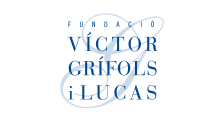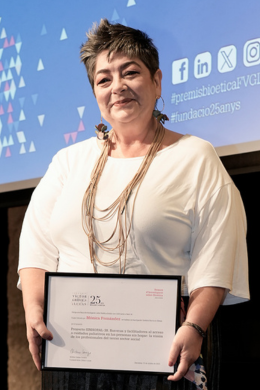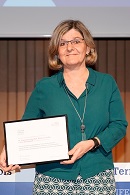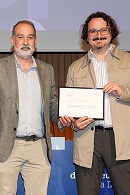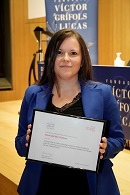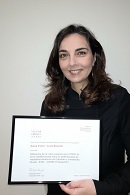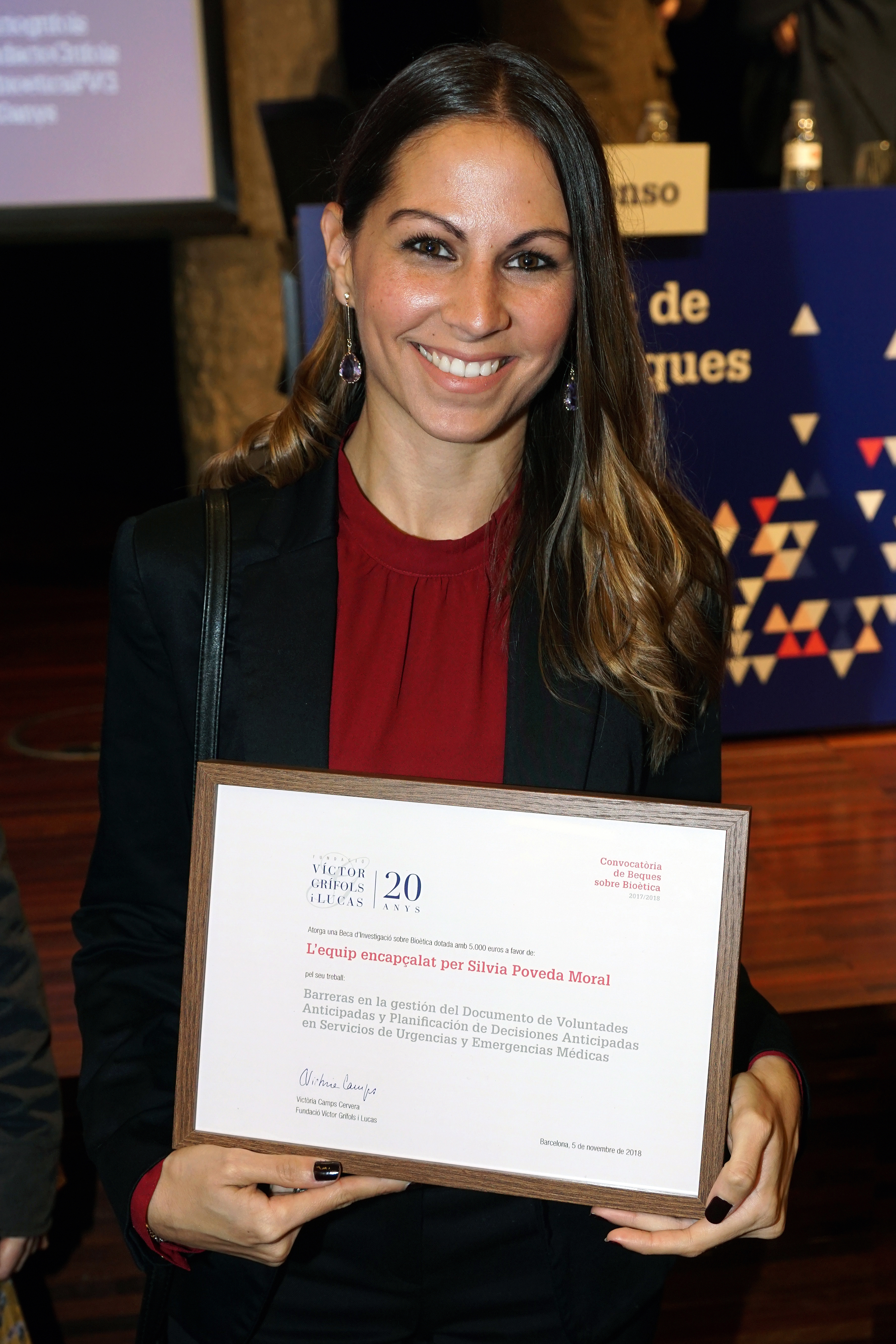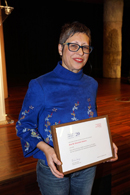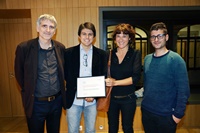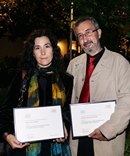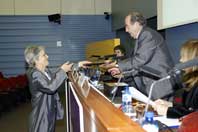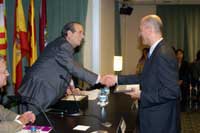Web Content Article
2025
Gloria Ortega and Judith Solé
"Coparentalidad contractual: implicaciones éticas y jurídicas” [Contractual co-parenting: ethical and legal implications] (Autonomous University of Barcelona)
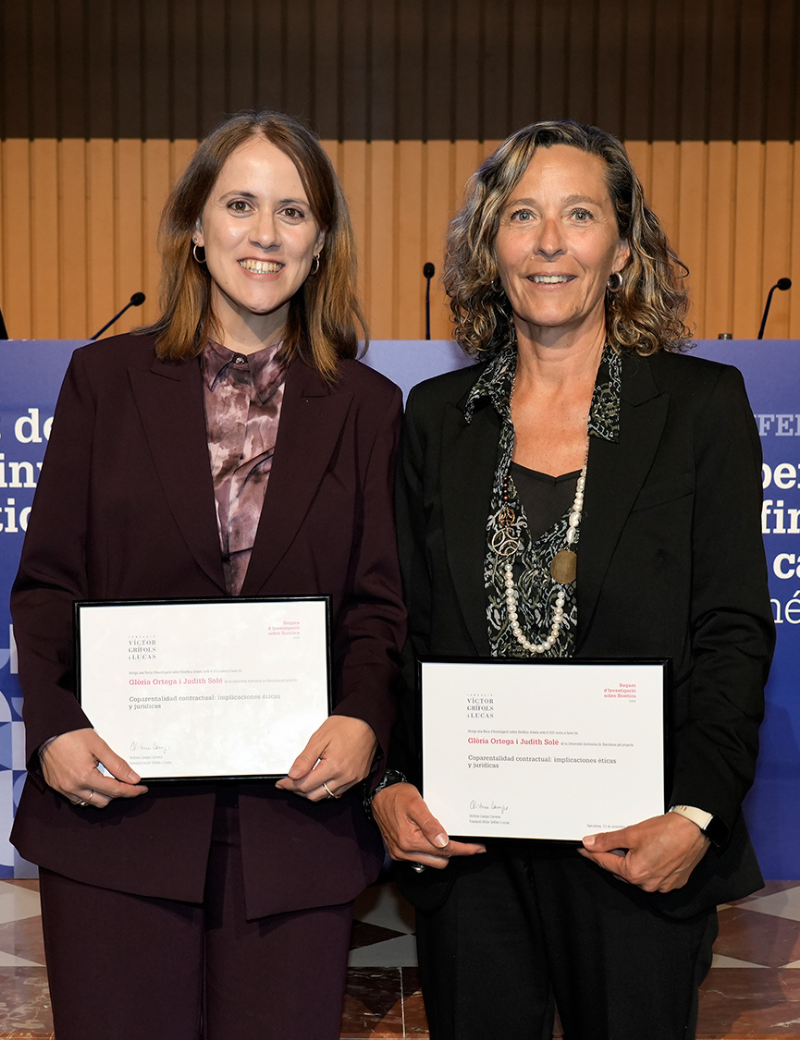
This project examines a new form of parenthood emerging in contemporary society: contractual co-parenting. This is a type of agreement in which two individuals agree to conceive and raise a child jointly without maintaining an affective or romantic relationship. Although increasingly common, contractual co-parenting remains unregulated in our legal system, raising questions about its legal validity and ethical implications, particularly with regard to the child’s best interests.
This study first identifies the defining features of this model, distinguishing it from other forms of parenthood, and analyses it from an interdisciplinary perspective that includes law, ethics, psychology, and sociology. The project also considers how other countries regulate similar arrangements, the role of co-parenting agencies, and the risks of commodifying parenthood. Its ultimate goal is to contribute to the development of policies that protect the rights of minors and provide a coherent legal framework for this emerging social practice.
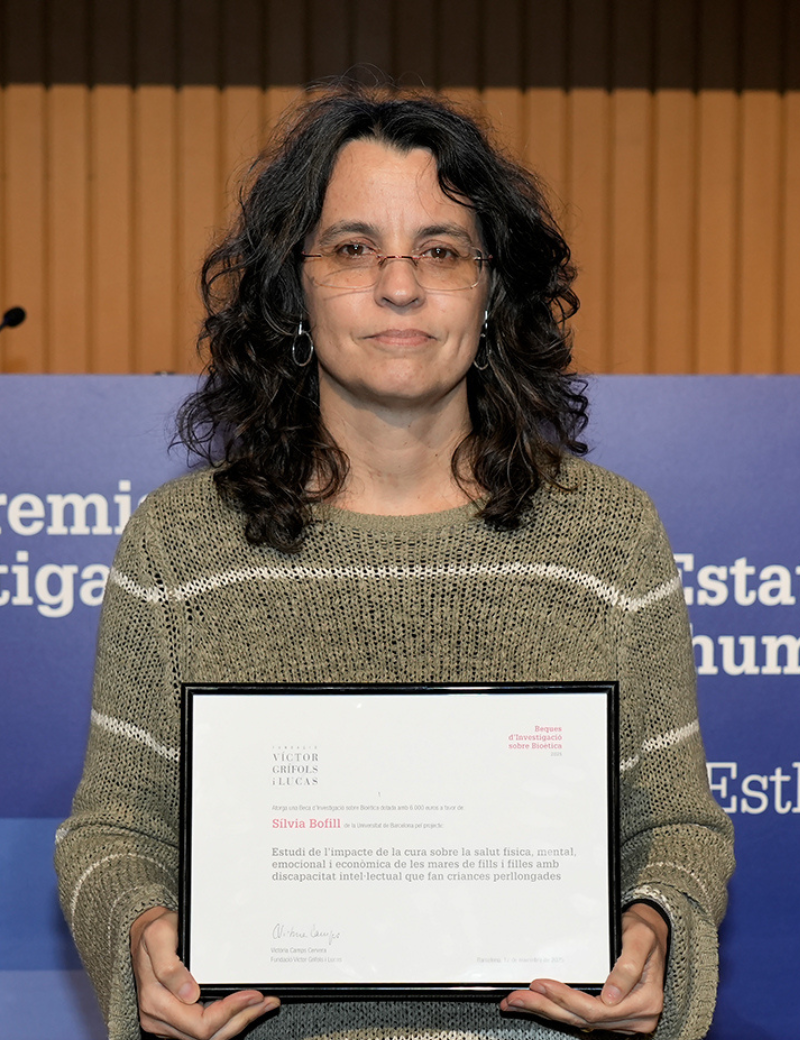
This project responds to the needs of the Sindicato de Madres en la Diversidad Funcional (Union of Mothers in Functional Diversity), an association of 200 women raising children with intellectual disabilities. Working largely on their own and in precarious situations, these mothers provide sustained care with little institutional support, a burden that directly affects their physical, mental and economic well-being. Despite the essential role mothers play in this context, their experiences remain largely invisible in research on care, which seldom integrates the perspectives of gender, social class and disability.
This project aims to address this gap by collecting quantitative and qualitative data to better understand these mothers’ realities and inform policies tailored to their needs. The research is conducted collaboratively, with mothers actively participating in its design and implementation, and follows an interdisciplinary approach that integrates nursing, psychology, economics, and anthropology. Ultimately, the work seeks to recognise care as a fundamental value and social responsibility, contributing to the transformation of a current model that is inadequate and lacking in the necessary protections.
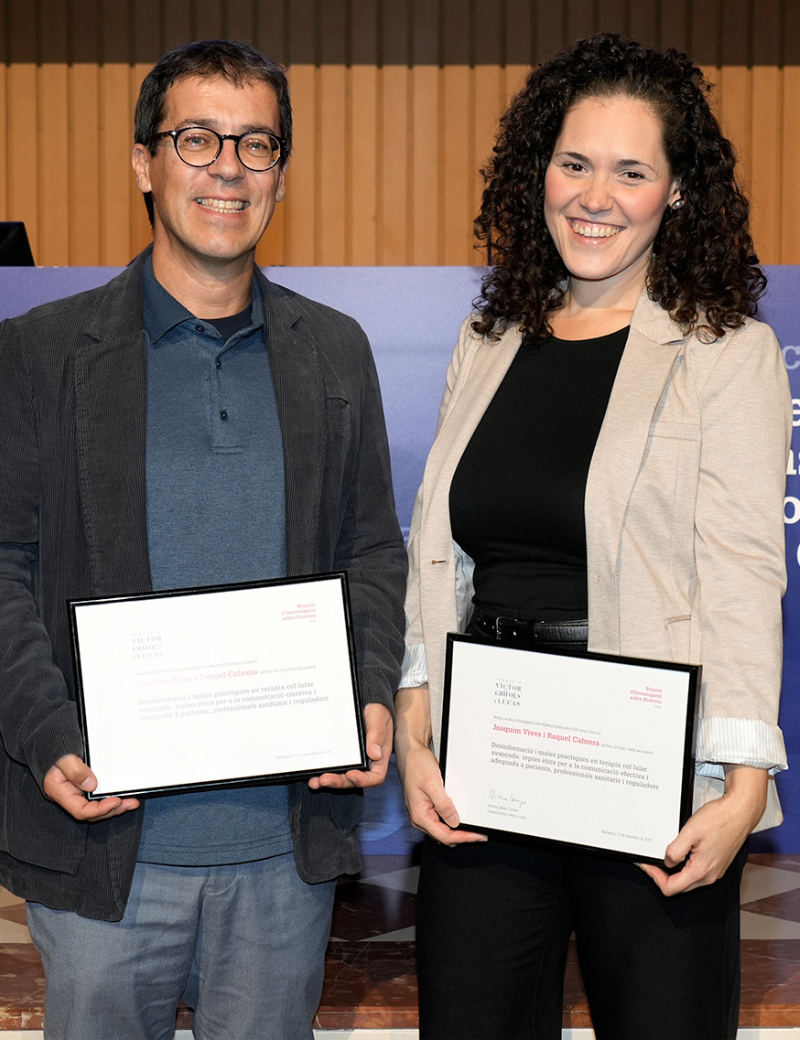
Advanced cell therapies, which involve the manipulation of tissues to develop innovative medicinal products, represent a major step forward in the personalised treatment of diseases previously considered incurable. However, despite their transformative potential, the complexity of these therapies—combined with the slow authorisation process—has generated frustration among patients and families. This frustration often leads some to resort to fraudulent alternatives, such as medical tourism or unregulated "stem cell clinics". This situation makes it difficult to establish a clear boundary between innovation and malpractice, compromising patient safety and eroding public trust in biomedical research.
The FLUENTCELLS project aims to identify the most common misconceptions held by patients, healthcare professionals and the general public about advanced cell therapies, to document cases of unethical or unsafe practices, and to analyse the regulatory and communication shortcomings that contribute to misinformation. Based on this assessment, the project proposes the development of a communication framework based on bioethical principles aimed at guiding public education, informing health policies, and strengthening the clinician-patient relationship, contributing to informed and safe decision-making.

The regulation of euthanasia in Spain has opened a debate on its application in patients with mental disorders. Although the law recognises the right to assisted dying in situations of severe and intolerable suffering, its interpretation in the field of psychiatry remains controversial due to the complexity of assessing the patient’s decision-making capacity and the subjective nature of psychological suffering. Experiences in Belgium, the Netherlands, and Canada show a growing number of requests from patients with mental disorders, highlighting the need for rigorous criteria and assessment procedures.
In Spain, most approved cases involve severe physical illnesses, while requests based on psychological suffering are rare and subject to a more thorough examination. However, the increase in such requests raises questions about healthcare professionals’ attitudes, the barriers they perceive, and the factors that influence their decisions. Understanding these dynamics is essential to ensuring a fair and consistent application of the law.
The project proposes the design and validation of a structured questionnaire to assess health professionals’ attitudes and perceived barriers concerning euthanasia in patients with mental disorders. Through the use of Delphi methodology and psychometric testing, the aim is to offer a reliable tool that can inform clinical practice, guide training, and support bioethical discussion in a particularly sensitive and complex field.
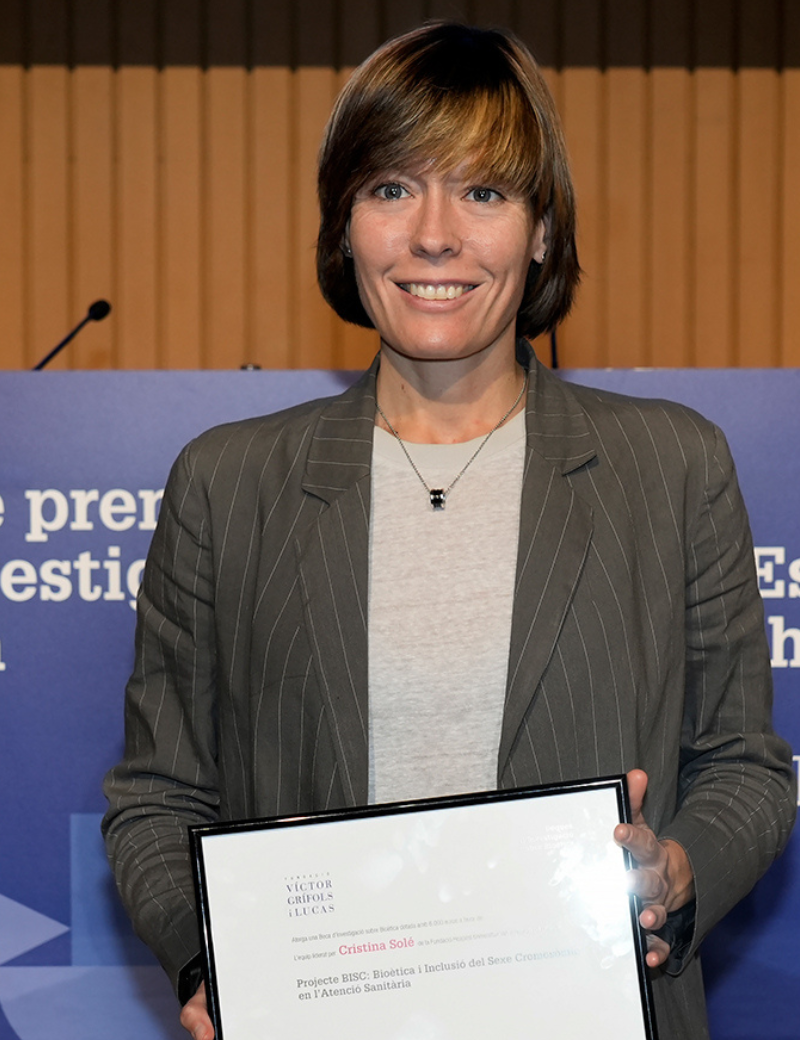
In recent decades, healthcare for trans and gender-diverse people (TGD) has progressed considerably in Catalonia, with pioneering models such as Servei Trànsit and a legal framework that reinforces self-determination and non-discrimination. Despite these advances, a key gap remains: how to ethically and safely incorporate relevant biomedical variables (such as chromosomal sex, organ inventory, and hormone use) into clinical and administrative systems without compromising fundamental rights such as confidentiality or self-determination. This challenge tests essential bioethical principles of autonomy, beneficence, non-maleficence, and justice, manifesting in real-world issues involving digital health records, clinical protocols, and healthcare decision-making.
The project aims to develop a viable proposal for integrating these variables into the Catalan health system, combining scientific rigour with full respect for human rights. It promotes participative and interdisciplinary methods, involving TGD users, healthcare professionals, and experts in bioethics, law and health technologies, to reach consensus on what information needs to be collected, how it should be recorded, and with what safeguards. The project draws inspiration from initiatives such as those of the British NHS, which tailors screenings according to organ presence and hormonal history—for example, breast cancer screening in trans women or cervical screening in trans men with a uterus—demonstrating that safe, functional, and non-intrusive integration is technically feasible.
The expected impact is twofold: to improve the quality and safety of care for TGD people, and to strengthen equity and research through more accurate and representative clinical data that move beyond the traditional binary model. Achieving this will require the adaptation of medical records (with tiered access and strict need-to-know criteria) and protocols, training, and co-production mechanisms with the TGD community.
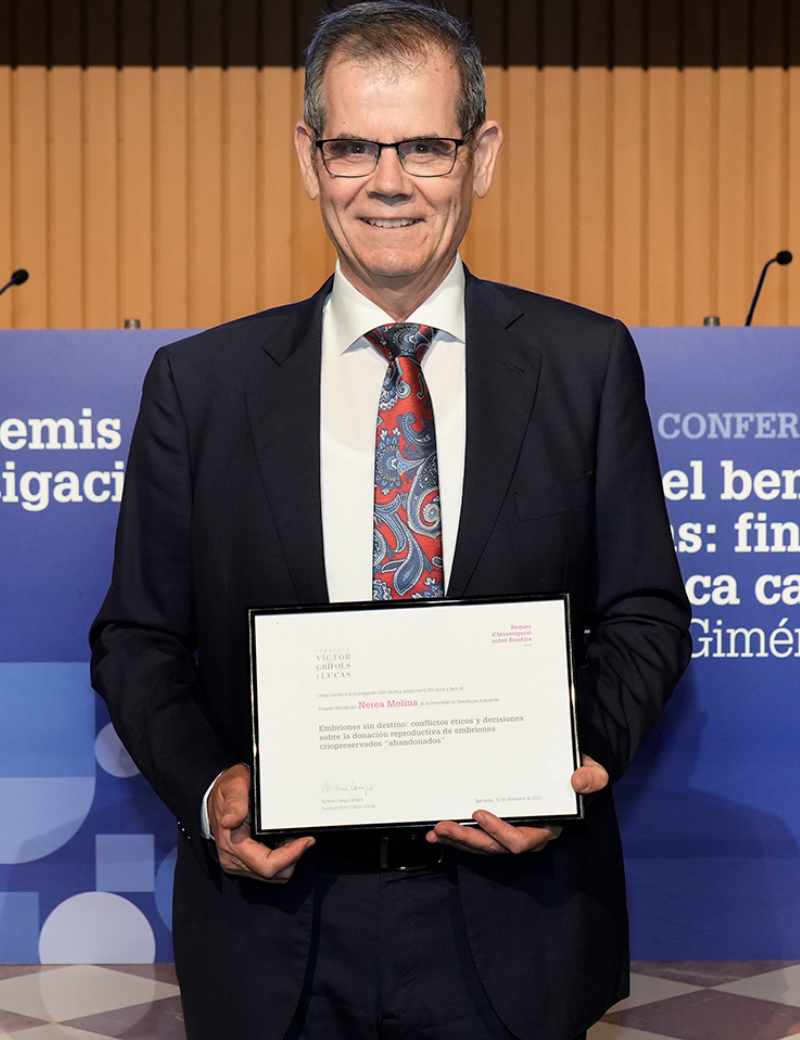
In Spain, there are approximately 800,000 cryopreserved embryos, of which an estimated 10-15% lack a defined destination due to the non-renewal of consent. This situation creates a complex dilemma: the original intentions of the progenitors remain unresolved while potential recipients lose access to a more equitable and affordable reproductive option. The current regulatory and procedural gaps contribute to the growing accumulation of embryos in assisted reproduction clinics and raise ethical, legal, and social issues.
The project addresses, for the first time in the Spanish context, the perceptions, motivations and barriers experienced by the three key actors involved in the donation of surplus embryos: progenitors, potential recipients, and health professionals. Through a qualitative design based on interviews in both public and private clinics, the study examines the clinical, emotional, and regulatory factors that influence decision-making. The goal is to understand the ethical conflicts and institutional conditions that hinder or facilitate the donation of unclaimed embryos for reproductive purposes.
2024
Team led by Gonzalo Solís García
“Dilemas éticos y consejo perinatal en recién nacidos prematuros en el límite de la viabilidad” [Ethical dilemmas and perinatal counselling in premature infants at the limits of viability] (Hospital Universitario de La Paz de Madrid)
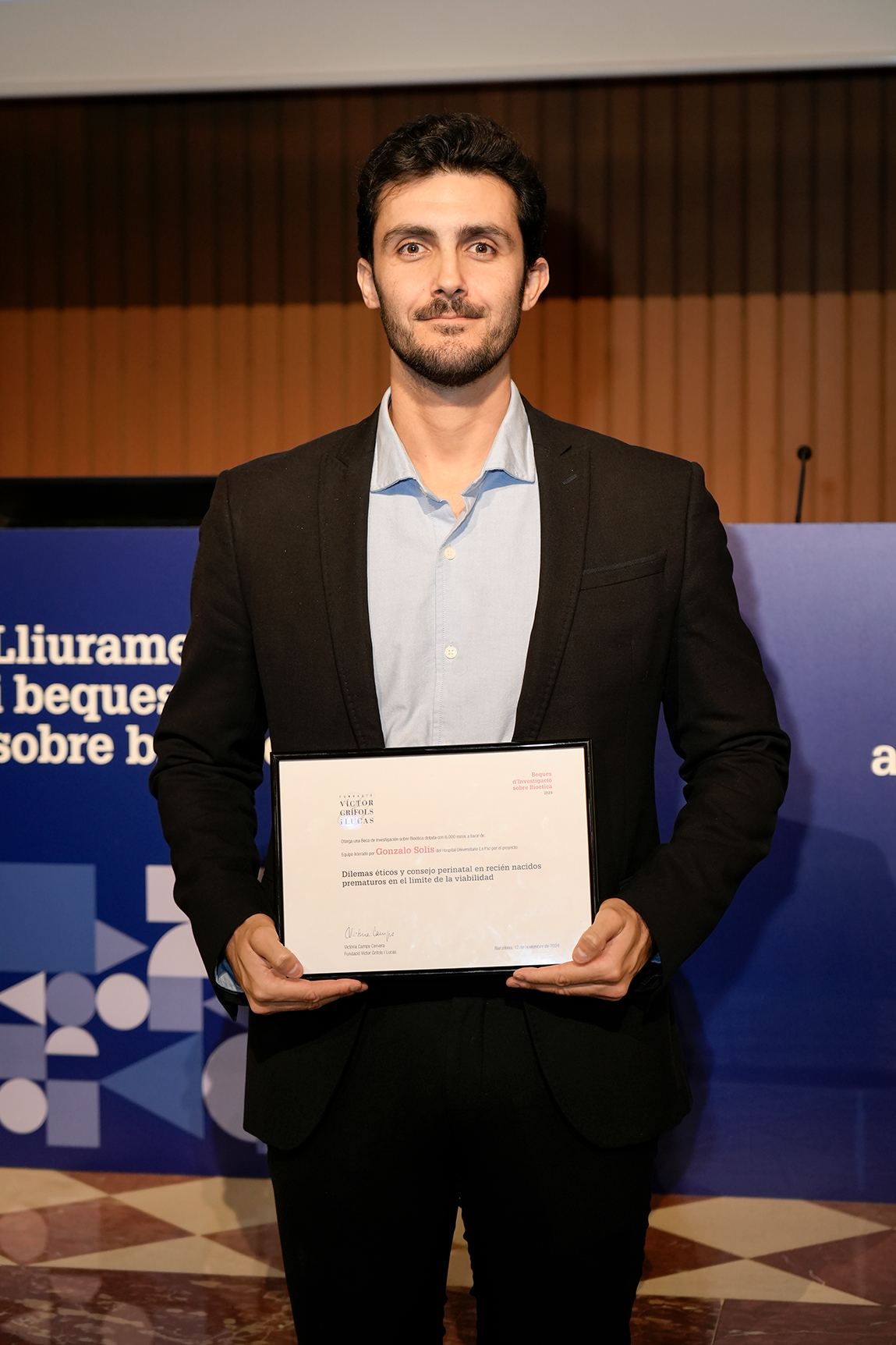
Preterm birth is the leading cause of infant mortality and disability in countries of the EU. While advances in perinatology have achieved a disability-free survival rate exceeding 90% in pregnancies beyond 26 weeks, outcomes vary significantly for pregnancies under 25 weeks.
From a bioethical perspective, determining the gestational age limit for viability is a difficult task which is usually based on the likelihood of survival without long-term consequences for the infant. Defining this limit is crucial when deciding whether the newborn should receive active life-sustaining treatment or palliative care.
This project examines the ethical dilemmas that arise in the care of extremely premature infants, evaluating the perceptions of families and healthcare professionals regarding the information provided and decision-making related to the limits of infant viability. Its goal is to develop a guide that improves communication with all those concerned, ultimately enhancing the quality of life for premature infants and their families.
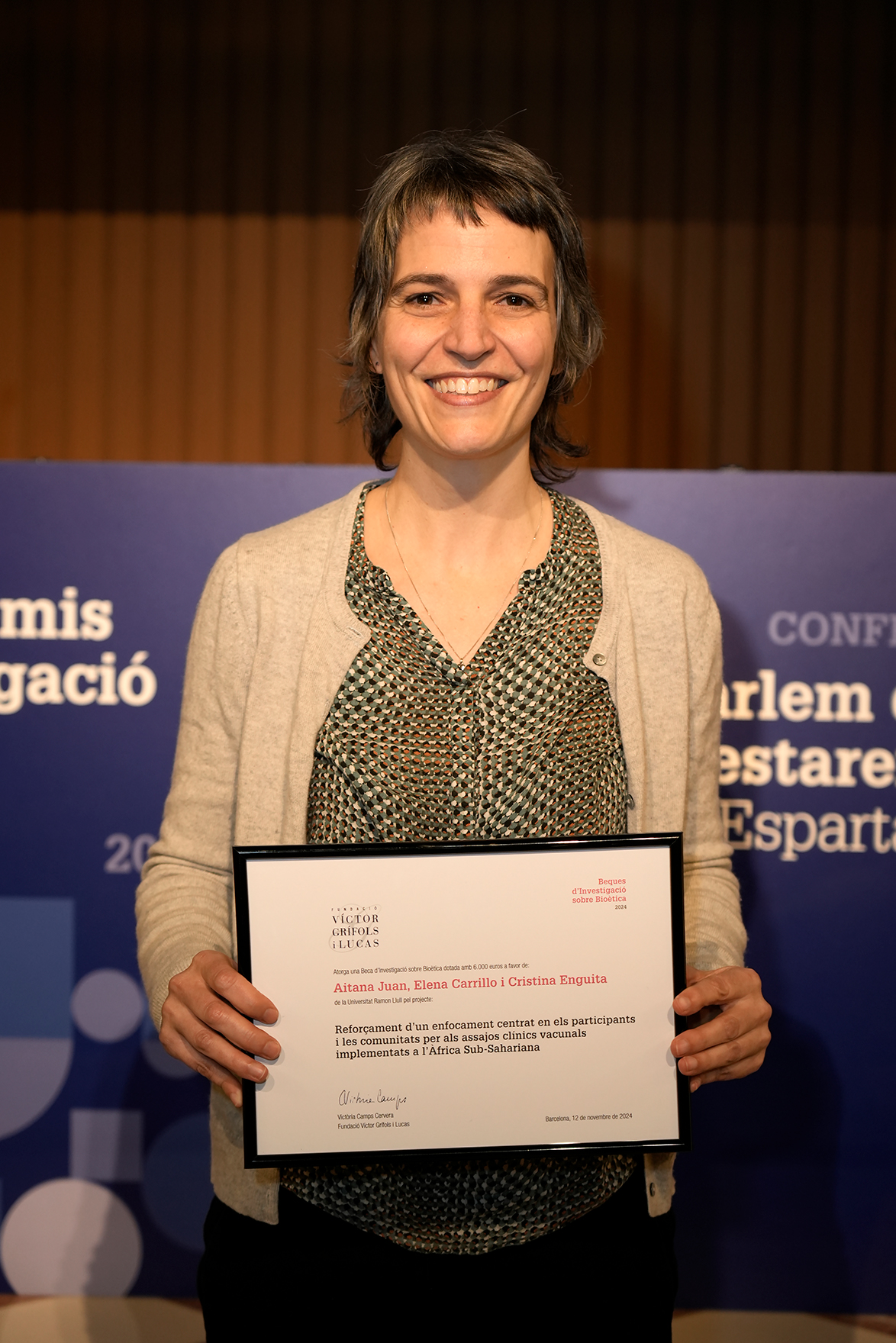
Ensuring informed, autonomous, and voluntary participation of subjects in clinical research remains a challenge in sub-Saharan Africa. Sociocultural, economic and historical factors influence the perception and understanding of such studies, affecting subjects’ consent. Vaccine trials present additional challenges, as they depend on people’s prior knowledge of disease prevention and vaccination programmes.
The project seeks to improve information and consent processes for participation in vaccine trials across sub-Saharan Africa. This project offers a community- and participant-centred approach which considers subjects’ needs, values, and preferences as well as the methods used in previous vaccine trials.
This study is divided into three phases. Phase One involves a literature review to identify studies on information and consent processes in vaccine trials. Phase Two is a qualitative study enabling a description of current practices. Phase Three will explore the use of a participant- and community-centred approach in the design of these processes. The grant focuses on the first two phases of the project.
Publications:
Adrian Villalba, Anna Smajdor and Daniela Cutas
“ADN sintÉtico: Un análisis anticipatorio en reproducción asistida” [Synthetic/Ethical DNA: an Anticipatory analysis in assisted reproductive technology] (Universidad de Granada)
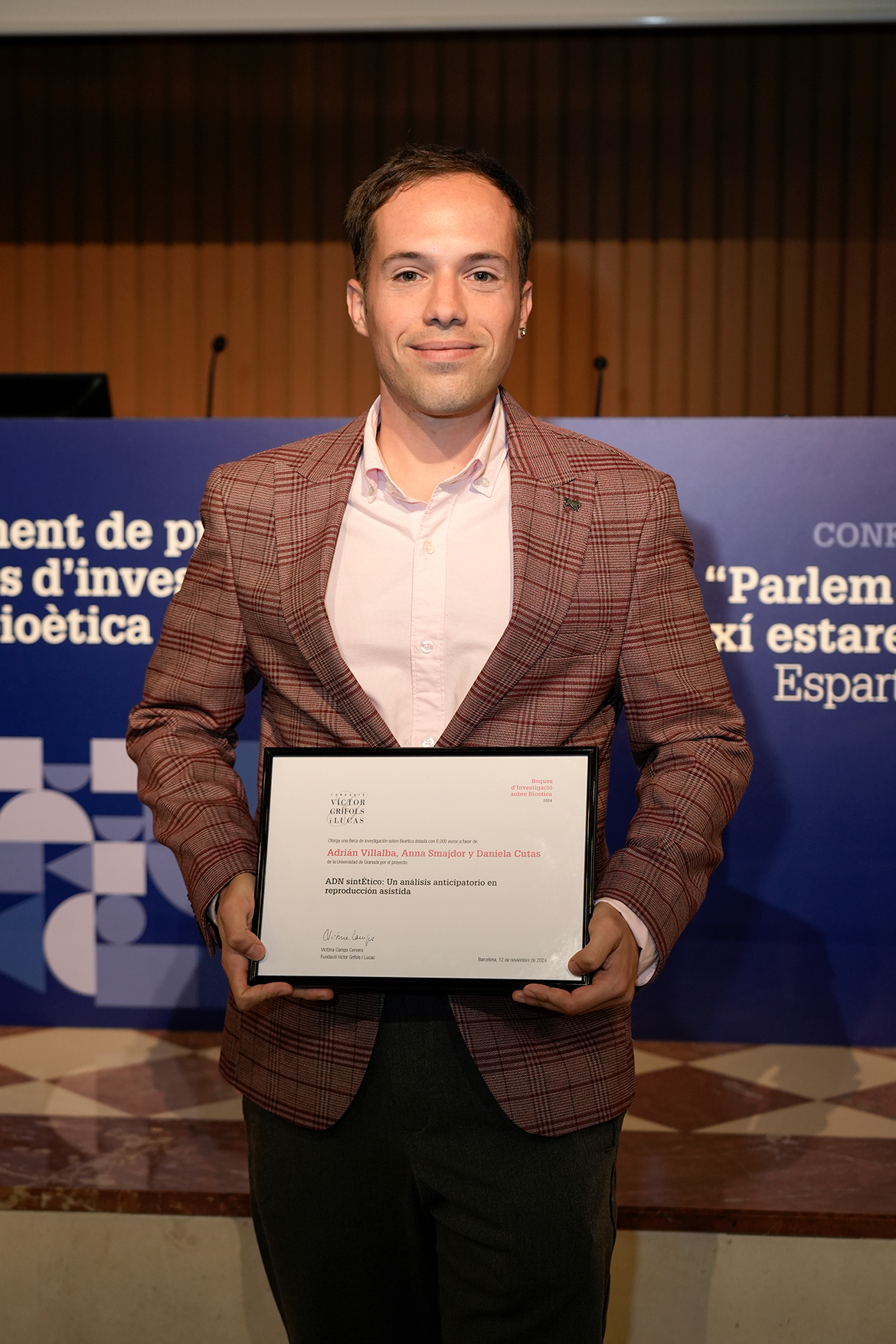
Recent advances in DNA synthesis have enabled the creation of synthetic genomes. Through this technique, the components of DNA (nucleotide molecules) can be joined together as if they were pieces of a puzzle. This has enabled the creation of bacteria with completely new genomes.
Some teams have successfully created synthetic genomes of some bacteria, highlighting the potential for producing human genomes in the near future.
These techniques pave the way for new applications in medicine, assisted reproductive techniques, and genetic research. However, they also raise ethical concerns regarding their use and the social implications of such technology.
Publications:
- Non-viable embryos created with synthetic DNA
- Synthetic gametes and the non-identity problem: the babies of tomorrow
- Synthetic DNA and mitochondrial donation: no need for donor eggs?
- The ethics of synthetic DNA
Team led by Francesca Tassinari
“Aproximación ético-jurídica al tratamiento de datos de salud inmigrantes y refugiados para fines de salud pública en la UE” [An ethical and legal approach for processing migrant and refugee health data for public health purposes in the EU] (Universidad del País Vasco)
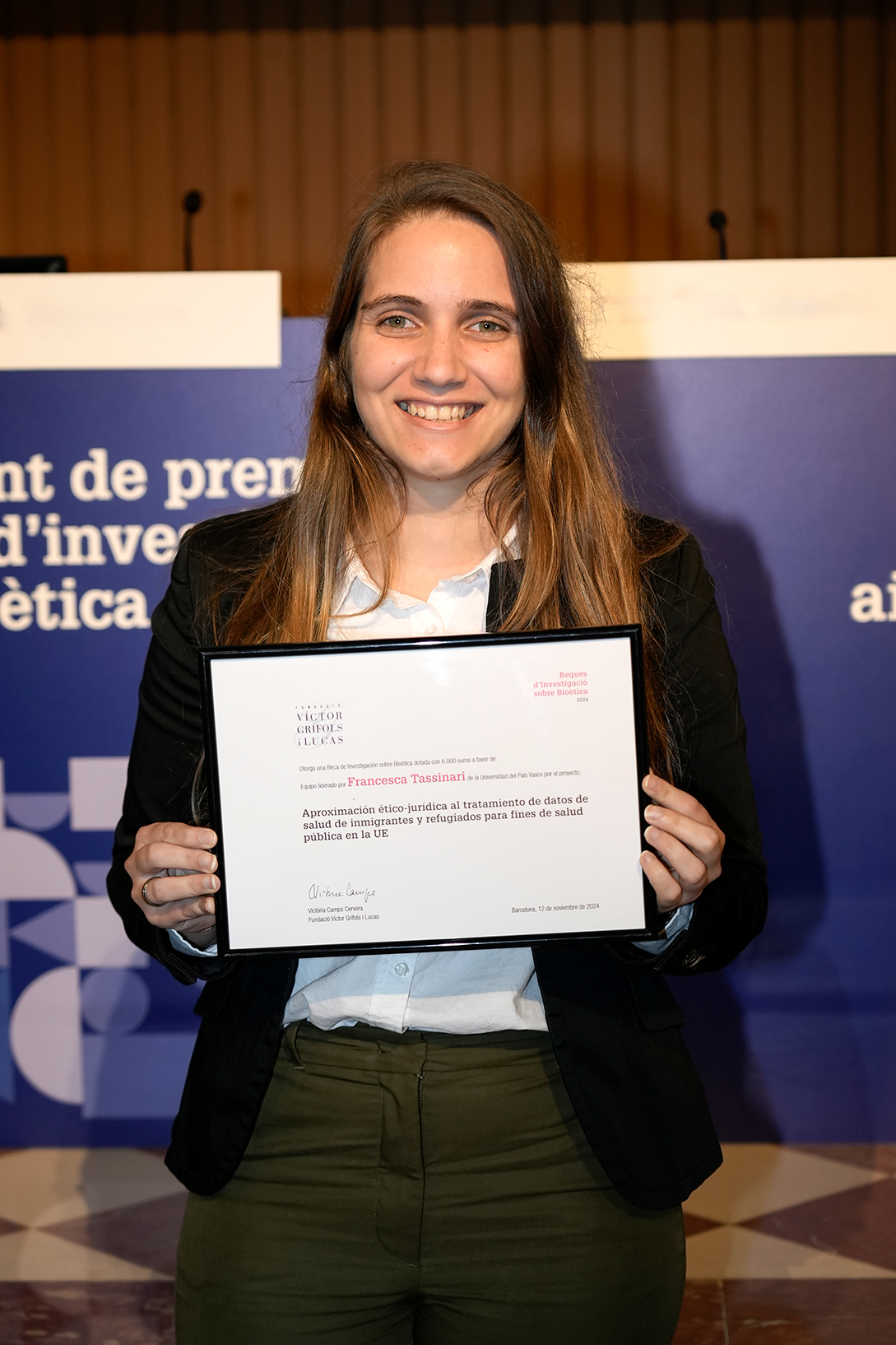
The migration phenomenon presents complex challenges for a state governed by the rule of law. It is essential to uphold our commitment to safeguarding the health of migrants and refugee populations, ensuring their access to health services based on the principle of universality. In Spain, Royal Decree-Law 7/2018 reinstated access to the Spanish national health system as a fundamental right, but its formulation has been criticised for creating obstacles that hinder equal access to such services.
Migrants may also carry contagious diseases, and early diagnosis could help prevent the risk of an epidemiological emergency. This requires health controls that involve the processing of sensitive personal data, in compliance with the General Data Protection Regulation (GDPR). This paper aims to provide guidance for balancing the rights of individuals with the protection of public health.
The project aims to strike a balance between the rights of migrant populations and the protection of public health, adopting ethical and legal principles for responsible handling of personal information. It also aims to raise awareness among professionals and establish limits on the use of health data, while enhancing the understanding of data protection among migrants.
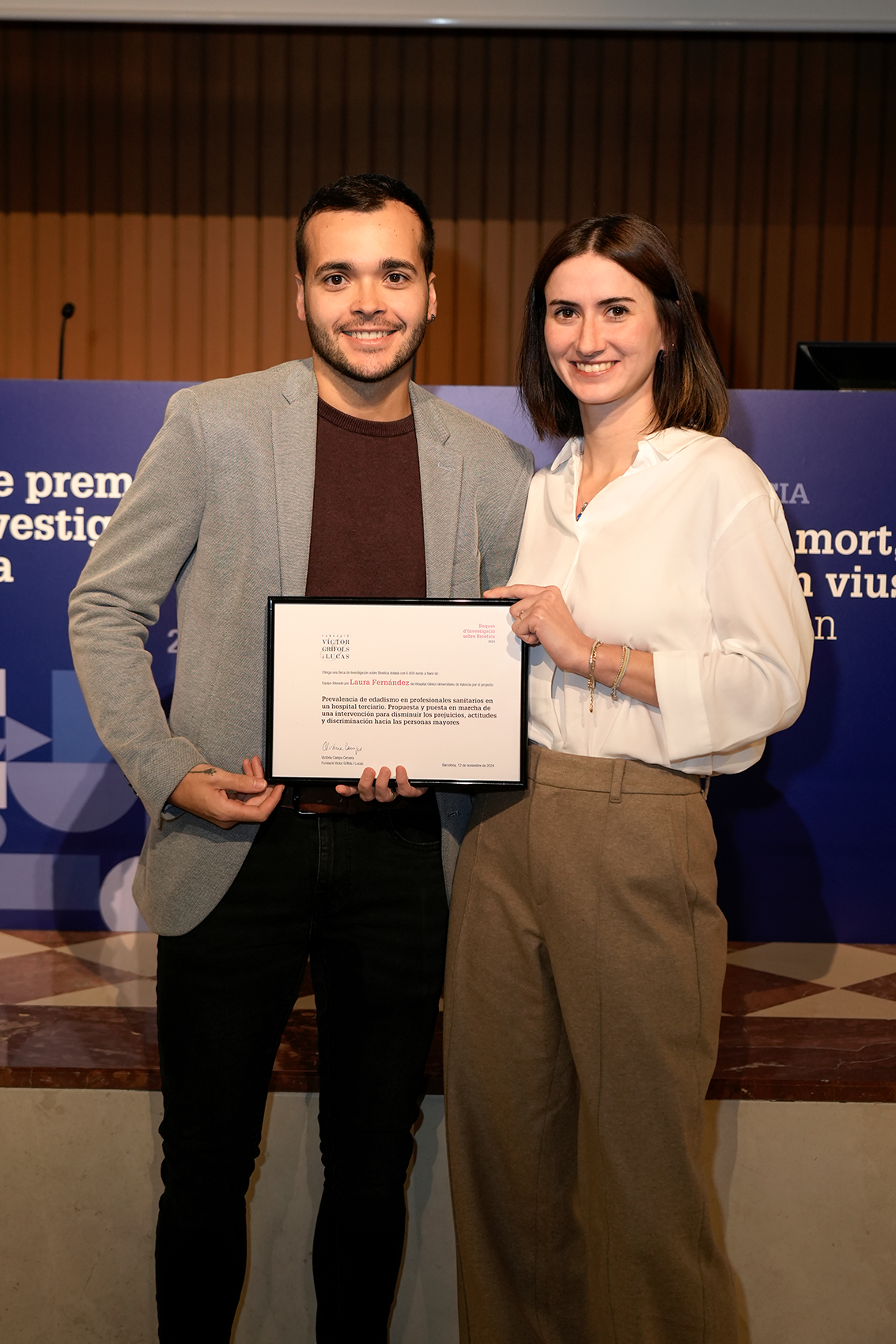
Our ageing population represents a significant public health challenge in the 21st century. The number of people aged 60 and older is projected to double, while those aged 80 and older are expected to triple between 2020 and 2050. Geriatric care should be a vital priority, yet older adults often face explicit and implicit discrimination and stereotyping, which perpetuate the prevalence of ageism.
Ageism is reflected in stereotypes, prejudice, and discrimination, adversely impacting the perception and treatment of older adults. These stereotypes include the belief that all older adults are frail or dependent, ignoring the true diversity and capabilities seen within this population.
To address ageism in healthcare, this project aims to review the literature on ageism among healthcare professionals, assess the prevalence of ageist attitudes, and translate and validate the Fraboni Scale of Ageism questionnaire into Spanish. It also aims to reduce ageism through evidence-based interventions, enhancing the quality of services and improving user satisfaction.
Team led by Guillermo Lazcoz
“HALLAZGEN” [GENE-FINDINGS] (Instituto de Investigación Sanitaria Fundación Giménez Díaz de Madrid)
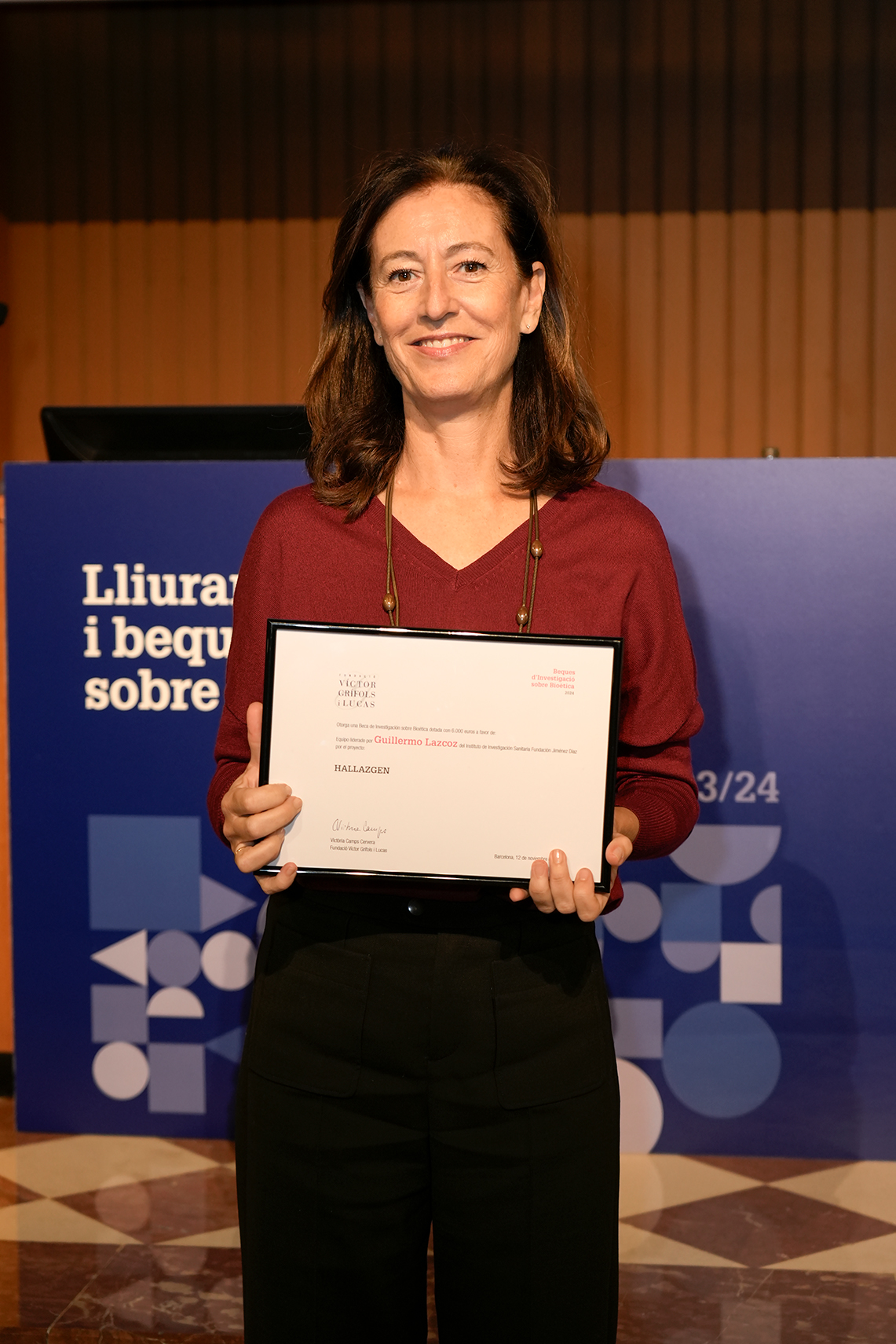
The development of high-throughput gene sequencing technologies poses new challenges associated with the management of the vast amounts of genetic data they generate. These technologies provide extensive genetic information about a patient’s current health status and future risks, which can also have implications for their family members and future offspring. As more genes are analysed, the likelihood of discovering clinically relevant findings increases.
This project examines the ethical and regulatory challenges involved in managing secondary and incidental findings that may be clinically relevant but are unrelated to the primary purpose of genetic testing.
The primary objective of the project is to develop clear, accessible ethical and legal guidelines for clinical and research staff engaged in complex genomic analysis. This includes recommendations for developing institutional policies on how to manage secondary and incidental findings and updating informed consent procedures for genetic analysis.
2023
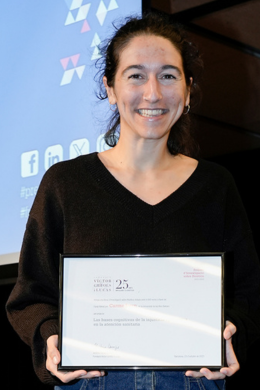
Individuals with medical conditions, particularly psychiatric ones, are often judged to be less credible due to biases associated with their status as patients. This form of discrimination is termed “epistemic injustice,” and it arises when individuals from specific social groups are regarded as less capable of possessing valid knowledge or seen as less credible compared to others.
This project explores the cognitive foundations of epistemic injustice in healthcare, using the experimental method to investigate the cognitive underpinnings of this form of discrimination. In particular, the authors examine whether epistemic injustice in individuals with clinical diagnoses is influenced by factors such as the impact of the label implied by the diagnosis, the epistemic privilege given to scientific and medical evidence, and the influence of the clinical context.
Publications:
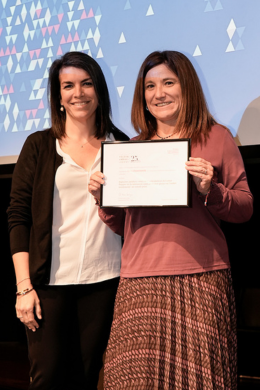
This project studies the feasibility of the initial prototype for human-robot social interaction, exploring the diverse functionalities offered by the Pepper robot. The study encompasses interaction through voice and a tablet, covering features such as conversation, information retrieval, and cognitive and physical stimulation exercises. Study participants will test the Pepper robot in two weekly sessions over the course of a month.
Simultaneously, the study authors will observe and reflect on the ethical aspects associated with the implementation of a social robot in residences of this kind. This will involve the analysis of applicable regulations and the identification of ethical concerns related to the use of social robots in these contexts.
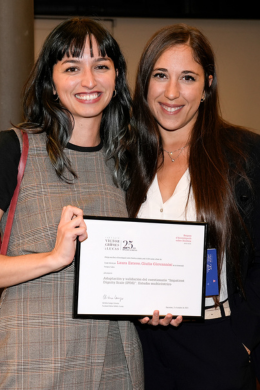
While the term “obstetric violence” is contentious and not universally accepted by healthcare professionals, the visibility of cases where women claim to have experienced violations of their rights by healthcare providers is increasing, both during pregnancy and childbirth.
The project aims to establish a legal argument that ensures the autonomy of pregnant women. The project involves two key aspects: re-examining the perception of pregnant women as patients and clarifying the status of the foetus in a medical context. The overarching goal of this work is to reassess the liability of professionals in perinatal contexts, ensuring that any potential harm to the well-being of the foetus does not result in non-consensual interventions in pregnant women.
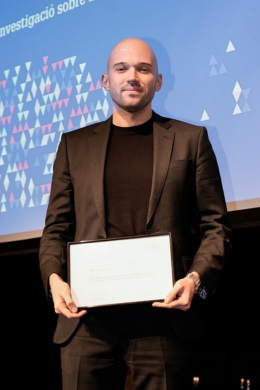
The notion of ethics of care has primarily centred on addressing issues such as the importance of patient emotional care, respecting human dignity, promoting personalised care, and advocating for deinstitutionalisation. Yet the significance of personal identity in the context of care has been seldom addressed, despite its central role in many care situations.
The goal of this project is to investigate the significance of personal identity in the context of care. Simultaneously, it aims to develop a more precise and comprehensive understanding of this concept in relation to the ethics of care. To do so, this project examines the issue of personal identity across different realms of care in order to develop an ethical framework for institutions.
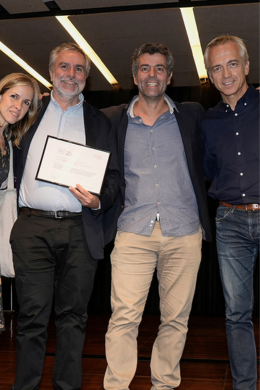
Drawing from a survey that asked respondents about the priorities of biomedical research objectives to improve the quality of life for individuals with spinal cord injuries, the majority emphasised the importance of human dignity over factors like mobility, posture, or locomotion.
Building on this foundation, the study serves as a space for communication between patients and aspiring scientists. This initiative seeks to generate knowledge, foster empathy for patients living with neurological injuries, and empower them through the education and training of future professionals in the field.
2022
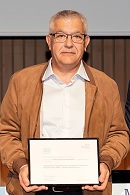
This descriptive multicenter study examines the difficulties faced by healthcare workers in maintaining inpatient dignity in clinical practice. The absence of applicable quantitative tools in Spanish scientific literature that can be used to measure the dignity of hospitalized patients has led this project’s authors to translate the Inpatient Dignity Scale (IPDS) into Spanish and carry out an evaluation of the resulting version.
The objectives of the project involve the validation of the Spanish version of this questionnaire, a translation and cultural adaptation of this tool, and an analysis of its reliability in terms of internal consistency and stability over time. The authors then evaluate whether this tool is as reliable as the original.
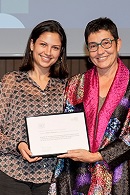
The hypothesis posited in this research project concerns healthcare worker reluctance to observe patient autonomy regarding end-of-life decisions. Questions and difficulties arise as we try to strike a balance between the traditional duty of a physician to preserve life and the principle of patient autonomy in deciding when to end their life, and requesting medical assistance to do so.
In this regard, the goal of the project is to offer an initial overall picture of the experience of healthcare professionals working in Catalonia as the LORE legislation comes into effect, in order to build upon our knowledge and formulate proposals for improvement.

New discoveries in the field of genetic engineering have obtained germ cells (artificial gametes) from human stem cells, which are undifferentiated. Artificial gametes offer a wide range of therapeutic possibilities, from infertility treatments to reproductive options for same-sex couples, people in the post-reproductive stage of life, or for single people wishing to have children.
This research project proposes a regulatory bioethical framework based on the principle of autonomy. The goal is to help determine acceptable or unacceptable situations in the field of assisted reproduction. The project also seeks to offer tools to evaluate regulatory compliance of practices involving the use of artificial germ cells and future assisted reproduction technology.
Publications:
- Synthetic embryos: a new venue in ethical research
- The Ethics of Cellular Reprogramming
- Re-defining the human embryo
- A letter to the article “Whole Body Gestational Donation”
- Queering the genome: ethical challenges of epigenome editing in same-sex reproduction
- The ethics of synthetic DNA

The bioethical debate on medical assistance in dying involves different groups with different viewpoints on the matter. However, the voices of the people requesting such assistance are often missing from this debate, their experience of the progression of their illness, their suffering, and the reasons compelling them to request medical assistance in dying.
To address this need, it is the aim of this project to build upon this knowledge by gathering testimonials and experiences of the very people faced with these end-of-life decisions. The goal here is to improve public policy, healthcare and social understanding of this medical service.
2021
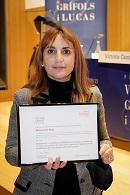
This project investigates the impact of the pandemic on the emotional system, health and quality of life of people with mental disability (multiple disability) who use residences in Catalonia, and of workers and relatives. The objective is to describe to the public authorities and the key decision-makers that occurred in residences from the start of the pandemic until completion of the vaccination programme (March 2021) and its consequences, to reflect on the most appropriate care model for these situations.
Research team formed by: Montserrat Puig, Antonio Rafael Moreno, Gemma Pérez, Montserrat Roca, Maria Teresa Lluch, Teresa Nicloás, Miguel Angel Hidalgo, Juan Francisco Roldán, Marta Prats, Zaida Palmira Agüera, Mª Aurelia Sanchez, Mª Carmen Moreno and Xavier Domènech
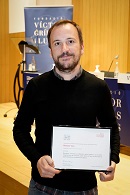
To gain a specific understanding of what is meant when we talk of structural violence in the context of colonization, health and bioethics, this project seeks to contextualize and define concepts such as "racism" and "colonization" with respect to the basic principles of bioethics and ethics as applied to medicine. It also seeks to offer a vision of health professionals in Africa, both expatriate staff and local, with respect to the racist ideology of colonialism.
Research team formed by: Rosauro Varo, Antonio Varo and Quique Bassat.
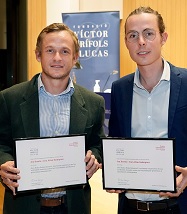
Gen-Ética Experimental consists in applying empirical and experimental methodologies to the study of the philosophical and psychological factors that influence people's moral evaluations of emerging genetic and genome technologies. Using controlled experiments, this project aims to generate empirical, philosophical and psychological knowledge about the what, the how and the why of legal and moral evaluations of these technologies.
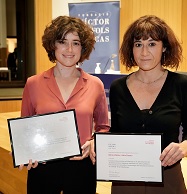
The aim of this project is to ensure ensure the ethical use, governance and scrutiny of the introduction of artificial intelligence (AI) systems in the health sector, in order to maximize the benefits of this technology and minimize the risks. Taking this as its starting point, the project seeks to develop an ethical framework to accompany the introduction of AI systems in public health campaigns, ensuring that AI is at the service of the common good and universal health coverage.
Publication:
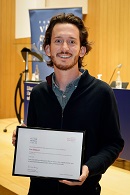
Numerous studies have identified the lack of international research into palliative pediatric care. This project seeks to determine the main clinical aspects of such care, drawing on the clinical narratives of health professionals: it compares the different ethical perspectives of professionals on the death of a patient; the moral characterization of patients and those around them (family and care staff); analysis of how decision-making is reported; and evaluation of the pedagogic impact of the goodbye message, a tool to inform health professionals involved in treating and caring for a patient of that person's death.
Research team formed by: Pau Miquel, Ignasi Clemente, Balma Soraya Hernández, Lucía Navarro, Lucía Peñarrubia and Daniel Toro.
2020
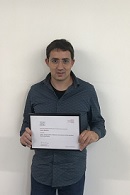
Taking the advanced democracies as its starting point, this project aims to identify the nature of the dilemmas posed by the pandemic and to undertake an empirical analysis of people's preferences with respect to these dilemmas. Starting with four dilemmas (governance of the pandemic, individual freedom, the economy, and the pandemic as a global problem) the project proposes identifying a series of survey questions to identify citizens' priorities in this regard.
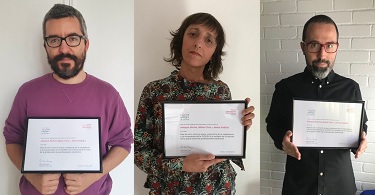
This study analyzes the arguments and reasoning of groups who are hostile to vaccination with reference to a possible vaccine against COVID-19 for the general population and to the flu vaccination among health professionals. The aim is to engage in deeper analysis and discussion of ethics and public health with respect to non-vaccination, facilitating interaction between health professionals and experts via a discussion forum.
Joaquin, Maite and Javier are all members of ESPACyOS
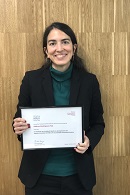
A lot of people have died alone and in isolation as a result of the COVID-19 health emergency. This project sets out to explore the experience of COVID-19 survivors faced with the prospect of dying in isolation, and analyzes the ethical dimension of their experiences.
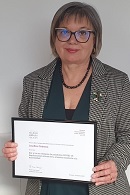
This project sets out to deepen our knowledge of the different forms of vulnerability, violence and the loss of rights that pregnant women experience in the context of the pandemic. To this end, it aims to develop a training programme to promote better education for midwives and other health professionals to help them deliver respectful care for women in the current situation.
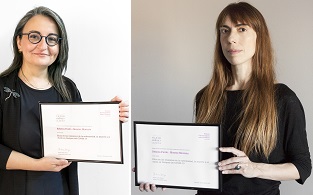
This project aims to identify the various bioethical implications of photographic representations of the pandemic in the media and to detect the photographic narratives specific to the pandemic, both those produced by professionals and by ordinary people, including images shared on the internet.

In the context of the COVID-19 pandemic health crisis, this project sets out to analyze observance of the ethical principles and recommendations set out by the Drug Research Ethics Committee (CEIm) in evaluations of protocols submitted in the context of the pandemic, with the aim of understanding the discourse and practice of researchers with respect to the ethical requirements of coronavirus research.
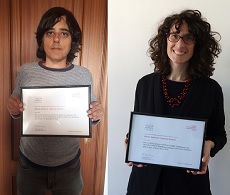
The appearance of ‘griefbots', enabling us to continue chatting with somebody who is no longer with us, or the chatbots used to help those receiving palliative care to face the prospect of death, raise numerous ethical questions about our relationship with technology. This project seeks to explore them, linking them with the latest trends in clinical psychology, which stress the importance of affirming the existence of continuing bonds with the dead person.
2019
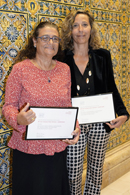
This project proposes that we need a new, wider legal meaning of the term ‘progenitor', one which goes beyond biological parents to include other people who are directly involved in creating a new life. This would open the door to the drafting of new laws to cover all the realities that need to be taken into account.

The general objective of this project is to study the application of the trust structure to the doctor–patient professional relationship, and to examine the bioethical consequences associated with this model. The project also aims to promote reflection on the institutional application of this research, which seeks to recognize and promote patient autonomy.

This project is designed to identify the frequency and point of application of end of life care in critical patients, analyzing the type and characteristics of Limitations on Life Support Techniques (LLST) in ICUs, with the main objective of evaluating the impact, moment and profile of patients to which LLSTs are applied.
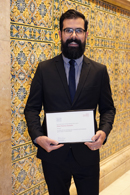
This project focuses on the need to undertake bioethical analysis of the application of Mitochondrial Replacement Techniques, a treatment that was initially developed to prevent mitochondrial DNA diseases but has also been used to treat fertility problems, despite the lack of scientific evidence to support its efficacy.
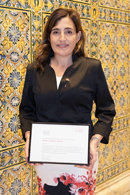
This project takes as its starting point the fact that, during the academic education of nursing students, insufficient attention is paid to the ethical view of the discipline. The aim is to promote the creation of instruments to assist with the design of educational interventions to increase ethical competencies and sensitivity in nursing practice.
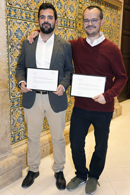
The main objective of this study is to open up a new line of bioethics research into the diversity of definitions and criteria when determining death. The study seeks to explore the theoretical justification for and ethical challenges raised by this diversity, and to evaluate its potential impact on society and on health professionals with respect to organ donation and transplants.
2018

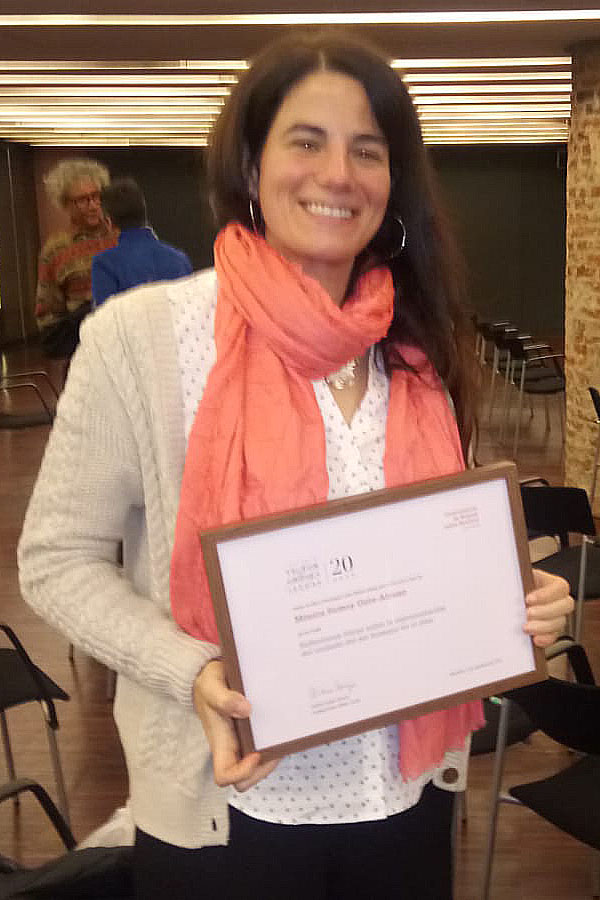
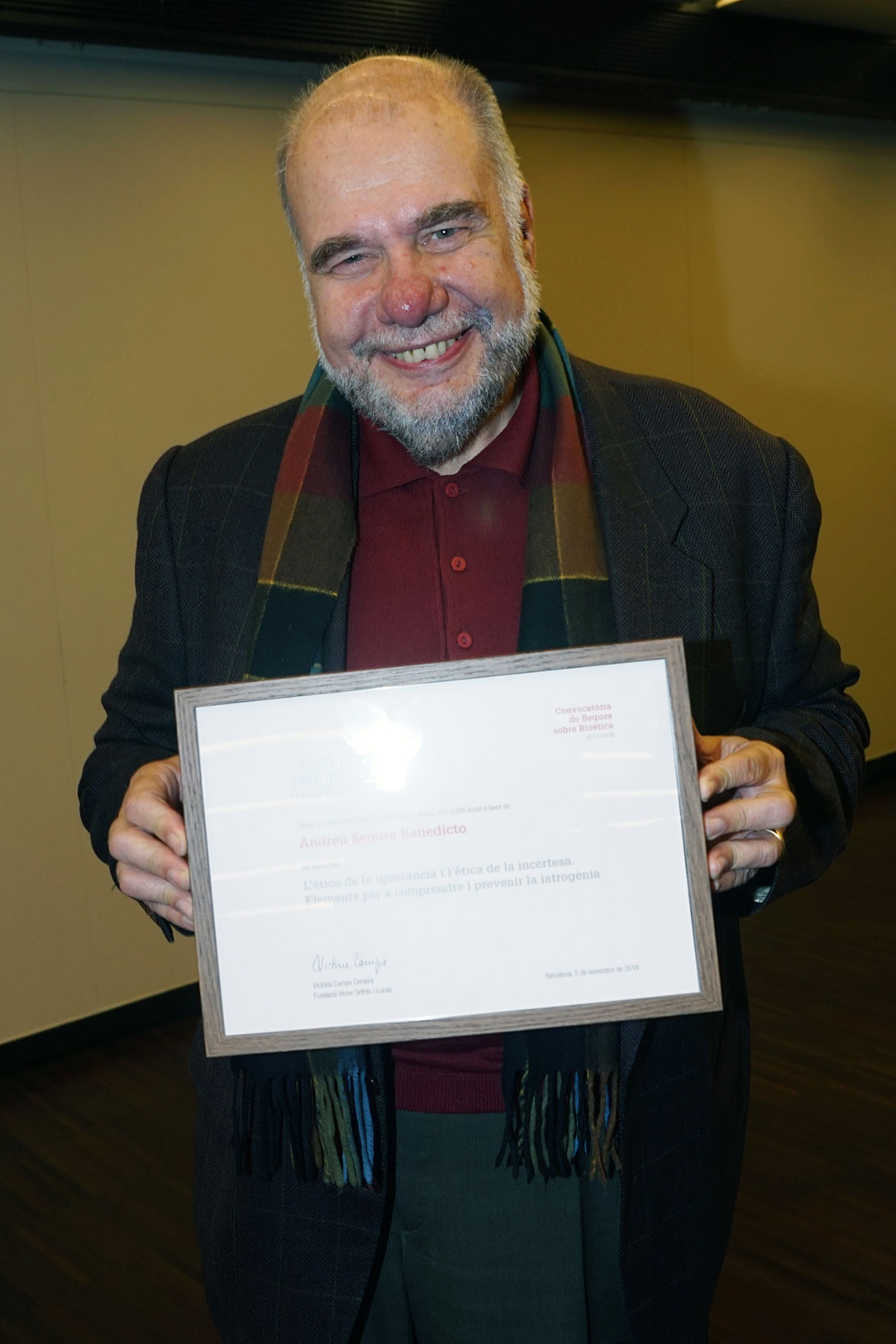
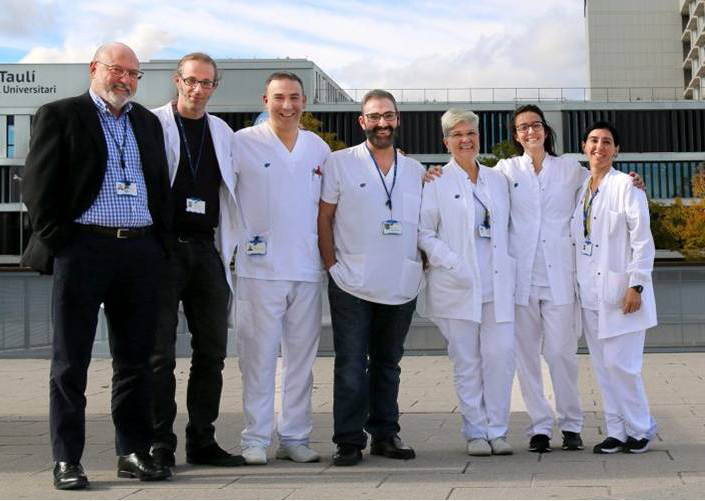
Alberto Granero, University of Barcelona
This project seeks to evaluate the process of evaluating the planning of advance directives in patients with severe mental disorders, by monitoring various structural, process and results indicators over a 2-year period. It aims to define the communication and relational process involved in planning an advance directive, and to promote the use of such tools.
Research team: Albert Granero, Miríam Santamaría, Pablo Hernando, Siddarta Acebillo, Igor Merodio, Montserrat Carmona y Alejandra Rubio
2017
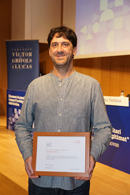
Ion Arrieta of University of the Basque Country/Euskal Herriko Unibertsitatea
The aim of this research is to explore the nature of the concept of autonomy habitually used in the ethics of care and medical ethics, and the possible shortcomings of this concept. It will also seek to investigate the factors that lead to such low treatment compliance among patients with psoriasis.
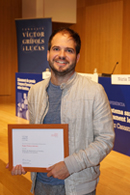
Hugo Viciana of Instituto de Estudios Sociales Avanzados (IESA-CSIC).
This project uses a survey of a representative sample to investigate how the Spanish population conceives disagreements around a list of prototypical ethical questions. The project also aims to identify social and cognitive correlations to propose a model for understanding popular attitudes around disagreement in this area. Finally, it will conduct a study with healthcare and bioethics professionals to examine aspects where the reasoning of specialists tends to differ from that of the general population.

Beatriz Campillo of Hospital de la Santa Creu i Sant Pau.
This project aims to construct and identify the properties of a psychometric questionnaire to evaluate the perception of respect and maintenance of dignity in hospitalized patients.
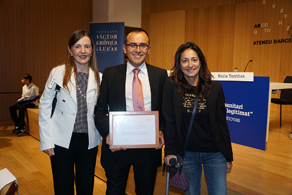
The team led by Christian Villavicencio of Caredoctors
The research aims to explore the values and wishes of patients with chronic, complex illness and patients with chronic, advanced illness. It also seeks to identify the perceptions of their families regarding their values and wishes in an irreversible situation with a poor prognosis. The project will conduct a descriptive, prospective study with patients at the Fundación Santa Susanna, Caldes de Montbui.

Sabel Gabaldón of the University of Barcelona
This is a doctoral thesis that aims to conduct applied ethical research on medical and psychological interventions in children and adolescents with gender variability, transsexual issues, and categorization using the current term: gender dysphoria.

Júlia Martin Badia of the University of Barcelona.
This project aims to construct and publish an innovative play and learning tool in the health setting. This seeks to implement pedagogical approaches in hospitals that consist in humanizing support for hospitalized minors by responding effectively to their biopsychosocial and educational needs before, during and after hospitalization. It is inspired by narrative bioethics and role playing.
2016
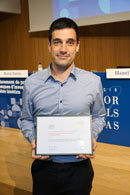
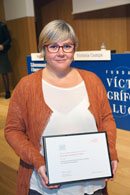
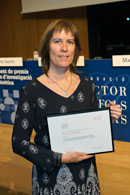
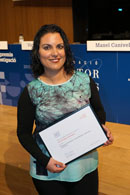
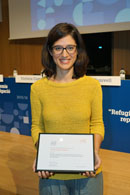
Rosana Triviño Caballero, of the Institute of Philosophy of Spain's Higher Council for Scientific Research (CSIC), who was awarded a grant for her study: "Comparative study of protocols for accessing the interruption of pregnancy in the European Union (ProtoAccess)."
The purpose of the project is to determine whether the conditions for accessing the interruption of pregnancy (IP) in European Union countries reflect the needs of women who are affected, and respect the classic principles of bioethics (autonomy, non-maleficence, beneficence and justice), reinterpreted in the light of feminist theories of care.
The project aims to conduct a comparative analysis of differences between practice and legislation in the member states of the European Union, possible reasons for this, and the potential impact of such requirements on access to IP. It also seeks to offer a framework protocol designed to adjust the conditions of access, in cases where this could be necessary.
2015

To Gemma Robleda and Josep-E. Baños of the Hospital de la Santa Creu i Sant Pau and Pompeu Fabra University, respectively, for the project: "Evaluating pain in adults without the capacity for communication. A bioethical analysis in hospitalization units for critical patients" [L'avaluació del dolor en persones adultes sense capacitat de comunicació. Un anàlisi bioètic en les unitats d'hospitalització de pacients crítics].
Establishing the existence and intensity of pain is necessary if we are to provide pain relief, but in practice it is often very difficult to do so, particularly in patients who lack the capacity for communication. This study aims to analyze the pain evaluation methods used in units caring for critical patients, and to identify how frequently they are used. It will also seek to identify the pain relief treatments applied in painful procedures in these units, and to discover the opinions of the health professionals who work in them.

To Elena Lauroba of the University of Barcelona for the project: "The legal protection of intersex people: reconsidering the (arbitrary?) assignation of gender from a legal perspective" [La protección jurídica de las personas intersexuales: repensar desde el derecho las asignaciones (¿arbitrarias?) de género].
The author submitted a proposal to research the legal situation of intersex people – those who, in biological terms, cannot be unequivocally identified as belonging to one or other gender (male or female). Her aim is to analyze the level of protection afforded to their rights, both with regard to human rights and in terms of private law (name, privacy, marriage, etc.). She also aims to identify specific initiatives and actions in the public policy sphere.
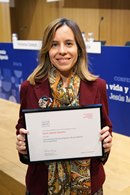
To Sonia Jimeno Ramírez of the University of Barcelona for the project: "Biotechnological patents: at the limits of legality" [Las patentes biotecnológicas: en los límites de la legalidad].
This research project seeks to analyze the ethical limits on industrial and intellectual property, particularly with regard to biotechnological patents or "patents on life". The author will explore their social, ecological and health impact, in order to evaluate both the legality and the legitimacy of an issue that has been controversial both within the scientific and academic community and within civil society as a whole.

To Loreto María García Moyano of the University of Zaragoza for the project: "Constructing a tool to quantify professional commitment in nursing" [Constructo de un instrumento para cuantificar el compromiso profesional en enfermería].
The aim of this study is to construct a valid, reliable instrument to quantify the commitment of nursing professionals in Spain. Care is what defines the nursing profession. However, at present this is considered only from a technical perspective, and the ethical dimension – consisting of elements such as accompaniment, empathy and confidentiality – is ignored. Quantifying professional responsibility or commitment in nursing would help to identify the factors that underpin it, and would also be useful as a means of preventing burnout.

To the team led by Maite Cruz Piqueras of the Andalucian School of Public Health for the project: "Non-vaccination as a meeting point: analyzing discourse to build bridges" [La no vacunación como punto de encuentro: analizando discursos para tender puentes].
This study seeks to highlight the importance of and the reasons behind the argument against vaccination in children, which is often given far less coverage in the media than the countervailing arguments in favour. The researchers want to find points of dialogue and understanding between the two positions, starting from the exploration of the viewpoints of parents and health professionals who are opposed to vaccination, and of children who have not been vaccinated. As a result, the authors aim to develop a document with recommendations for institutions and health professionals, and to generate analysis and debate of the issue.
Research group: Maite Cruz Piqueras (Escuela Andaluza de Salud Pública), Joaquín Hortal Carmona (Hospital de Alta Resolución de Guadix), Javier Padilla Bernáldez (Hospital Universitario Virgen de Valme) and Ainhoa Rodríguez de Cortázar (Escuela Andaluza de Salud Pública).
2014
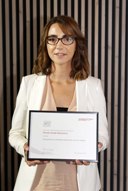
The team led by Priscila Giraldo of the Institut Hospital del Mar d'Investigacions Mèdiques (IMIM) for the project: "Comunicación y disculpa después de un error médico" (Communication and apology after a medical error).
Although there are currently a large number of studies that demonstrate the impact of medical errors on patients, research on the communications after such errors occur is still incipient. Multiple factors such as social reputation, shame, or just a lack of institutional or social support, inhibit many professionals when communicating what has happened after they commit an error. This project aims to research these aspects, and analyze the strategies followed by other countries to produce a series of legal and ethical recommendations and to provide Spanish healthcare centers with a suitable program for communicating errors and making apologies.
This research has been published in Gaceta Sanitaria (Health Gazette) as a brief article:
Giraldo P, et al. Análisis de las barreras y oportunidades legales-éticas de la comunicación y disculpa de errores asistenciales en España. Gac Sanit. 2015. http://dx.doi.org/10.1016/j.gaceta.2015.11.007
You can read it here
(in spanish)
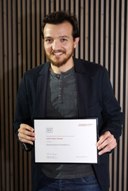
Jordi Cabòs Teixidó of the Universitat de Barcelona for the project: "Epidemiologia de la Resiliència" (Epidemiology of Resilience).
This research project offers an ethical reflection in relation to the creation of meaning when faced with difficult situations. The study aims to examine the role of organizations and healthcare workers when helping to create a meaning and overcome the circumstances that millions of citizens are currently suffering due to the devastating effect of the economic crisis.
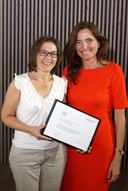
Míriam de la Flor of the Hospital Universitari Joan XXIII for the project: "Programa de toma de decisiones compartida en el cáncer de mama con mastectomía. El derecho de la mujer a decidir" (Shared decision-making program in breast cancer with mastectomy. The right of women to decide).
The diagnosis of breast cancer entails a situation of great stress. With this in mind, the project proposes the creation of an application that uses a fictional character (an avatar) to accompany women on a virtual tour that follows the decision-making process for the different therapeutic possibilities offered.

Oriol Yuguero Torres of the Universitat de Lleida for the project: "Estudio de la empatía de los médicos y enfermeras de Atención Primaria de la Región Sanitaria de Lleida y su relación con las variables clínica" (Study of the empathy of physicians and nursing staff in Primary Care in the region of Lleida and its relationship with clinical variables).
This project analyzes the level of empathy shown by healthcare professionals working in primary care centers in the region of Lleida. Various studies have linked the level of empathy, the ability that these professionals have in putting themselves in the situation of the patient, with greater ethical competence.
Sergio Ramos Pozón of the Universitat de Barcelona for the project: "El documento de voluntades anticipadas en salud mental" (The advance directives document in mental health).
The overall aim of this research consists in conducting a theoretical reflection based on empirical data on the need for psychiatric advance directives (PAD) in mental healthcare.

Omar García Zabaleta of the Universidad del País Vasco for the project: "El concepto de autonomía del DSM 5: rasgos y posibles implicaciones de su modificación" (The concept of autonomy of the DSM5: characteristics and possible implications of its amendment).
This project aims to address the definition of the concepts of health and sickness and what we consider normal and what can be classified as pathological; aspects which have traditionally been a necessary and complicated task for psychiatry. From the beginnings of medicine, there have been many attempts to clarify the nature of both concepts and the fine line that separates them. However, even today one could argue that none of these has proved to be entirely convincing.
2013

María Amparo Bodi of the Institut d'Investigació Sanitària Pere Virgili (IISPV) for the project: A description of practices to limit life-sustaining therapy in ICU and the potential impact on donation after controlled cardiac death.
The project aims to establish the basis for implementing a program for controlled donation after cardiac death (DAC), at the Joan XXII University Hospital. A prospective study was designed for this purpose to determine the current circumstances of life-sustaining treatment limitation (LSTL) and the characteristics of the patients to whom it is applied.

To Silvia Del Castillo Arrojo of the Fuenlabrada University Hospital for the project: How implantable defibrillators are currently managed in Spain in terminally ill patients and in end-of-life care. Are we considering deactivation?
Implantable cardioverter defibrillators (ICDs) have proven to be useful in preventing sudden death originating from cardiac arrhythmia. However the use of ICDs has given rise to controversy in recent years. The aims of this study are to discover the current situation at centers which implant and monitor the defibrillators in Spain in terminally ill patients or with a poor quality of life. The research focuses on finding out whether an established protocol exists for ICD management in terminal cases, and whether patients are informed of the possibility of deactivating the electrical shock therapies, and who decides this, among other issues.

To Noelia Igareda of the Faculty of Law at the Universitat Autònoma de Barcelona for the project: The right to know the biological origins versus anonymity in the donation of gametes.
The aim of this research is to study how the right to know the biological origins can be guaranteed in our legal system, and how this right can be protected with the anonymity of male and female gametes in the field of assisted reproduction techniques. The three lines of research are resumed in:
- a study of the current legal regulation of European citizens' rights in EU legislation and the EU Charter;
- an analysis of the opinions of citizens on the right to know one's own origins, in the context of new forms of affiliation born through assisted reproduction techniques;
- the identification and analysis of the arguments for and against the anonymity of the donors of gametes in recent European and international literature from bioethics, legal and medical perspectives.
To Elvira Pértega of the Hospital General Universitario Gregorio Marañón for the project: The use of physical restraints in pediatric psychiatry units: Is this an ethical clinical practice?
The use of physical restraints is the source of ongoing controversy and one of the unresolved problems of institutional psychiatry. It is currently being considered an error rather than a treatment. This project examines the use of physical restraints from the perspective of error. It aims to establish that the established dimensions of the physical restraints are erroneous and to examine the differences between this concept and appropriate practice or malpractice.
2012

To Michelle Piperberg of the Faculty of Philosophy at the University of Barcelona for the project: About the "person". An approach to the discussions about the end of life.
This project has several aims: The first is to define the concept "person" within the context of bioethics in developed countries in order to later analyze the different liberal attitudes and standpoints in end of life debates. The project also aims at addressing the implications of the concept "person" in a practical sense and how this concept bonds with the decision making process at the end of life. Finally the study deals with issues in relation to discussions about the end of life process such as dualism (body-person) in other words the distinction between "biographical death" or that of the person, and "biological death" or that of the organism.

To the team led by Germán Diestre of the Albada Healthcare Center for the project: Implementation of Advance Care Planning at the Albada Health Center. A qualitative study.
The main purpose of this project is to discover the perceptions and aptitudes of patients/representatives, families and healthcare professionals at the Albada Healthcare Center in relation to Advance Care Planning (ACP) and compare these with the center's official care program for End of Life Care.
The aim is to provide proof that the introduction of ACP helps provide a better experience for patients, their families and healthcare professionals as well as a significant improvement in the quality of healthcare at the end of life. Additionally the study hopes to gain insight into how the different parties involved perceive the process, in order to develop areas of improvement in the healthcare program and to define new evaluation indicators and criteria.
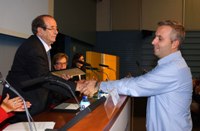
To Iván Ortega and David Rodríguez Arias of the Institute of Philosophy at the Higher Council for Scientific Investigation (CSIC) for the project: Organ Donation in Spanish Emergency Ambulance Services (ODISEAS).
The aims of this project are, on the one hand to explore the opinions of the different parties involved and identify the ethical problems that arise from the current Donation after Cardiac Death (DCD) protocols due to the non-existence of parallel Cardiopulmonary Resuscitation programs. On the other hand, the study also aims to encourage the different parties involved to enter into an ethical deliberation on the mentioned conflicts. Finally, the study proposes that the way in which out-of-hospital cardiac arrest (OHCA) is dealt with, be made compatible with the aforementioned protocols and with future Cardiopulmonary Resuscitation programs. The study expects to have an effect on how the Emergency Health Services in Spain operate and on others that follow similar programs.
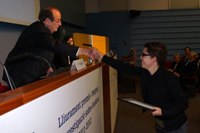
To Rosa María Medina and Sandra Fernández of the Faculty of Medicine at the University of Granada for the project: The triad formed by medical staff, family and patient in conditions of intersexuality. The situation in Spain.
The project aims to develop an exploratory study on the relationship between the team of professionals - the families - and patients in the context of the Spanish State, in cases of intersexuality in children.
In order to achieve this, it is essential to first determine the scope of the problem, the techniques and the different professionals that will interact with the mentioned triad. The second step is to analyze the role that the triad plays in the relationship that the patient maintains with his/her own body and identity. Finally, it is important to evaluate the results obtained, in order to achieve a better understanding of Informed Consent in cases of intersexuality.
2011
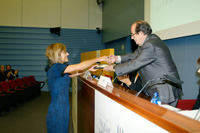
To Marta Roca i Escoda at the Institute of Law and technology at the UAB for the project: Gestation by substitution. Analysis of a current phenomenon.
The main aim of this project is to identify the different stances that emanate from the judicial and legislative discourse regarding this phenomenon. Different points of view will be compared to the stance adopted by couples composed of two men, who see these techniques as a legitimate way to access paternity, and who argue that this is a question of social justice.
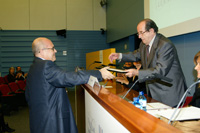
To the team lead by Magí Farré Albaladejo and Astrid Hernández of the IMIM Foundation for the project: Placebo information in clinical trials and its influence on participant decision.
This project consists of two sub-projects. The first is based on a review of how the placebo is explained on the information and consent pages for clinical trials presented to the CEIC-Parc de Salut Mar (Clinical Investigation Ethics Committee). The second, in a simulated clinical trial, aims to discover whether the amount of information provided to patients on the placebo, in the information pages, influences their decision to take part or otherwise.
Roser Marquet Palomer of the ICS EAP Canet de Mar (Canet de Mar Local Health Center) for the Project: Percepció de confidencialitat en les persones grans de l'àmbit rural (Perception of confidentiality in elderly patients in rural communities).
This project aims to discover the point of view of the elderly who live in rural areas: who they consider to be their necessary confidantes, what type of health information they allow these confidantes to be aware of, and under which circumstances. The aim is to incorporate the findings of this study when designing the procedures to be used in healthcare centers in rural areas.
|
|
|
|
2010
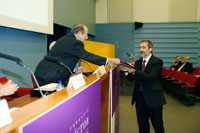
To the team led by Joan Canimas of the Campus Arnau d'Escala Foundation for their: Guia orientativa per a guardadors de fet de persones amb malaltia d'Alzheimer als quals es proposa participar en projectes de recerca clínica (Orientation guide for de facto guardians of people with Alzheimer's disease who decide to take part in clinical investigation projects).
The main objective of the project is to confect an informative guide to help orientate de facto guardians or conservators concerning the process by which they decide whether or not the person they are taking care of should participate in a clinical trial.
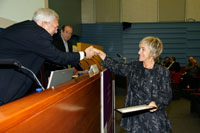
This study arises in view of the interest and concern to explore, discover and understand, how immigrants being cared for in a hospital infirmary at any of the different Catalonian University Hospitals, feel about the experiences they go through. The study is centered on economic and / or political immigrants from outside the EC.
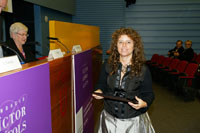
This project has the following objectives:
- To find out the opinions of mental-health-care professionals and the methods they use to ensure the confidentiality of patient information stored in digital files.
- To make proposals which can conciliate the common aspects of digitalized clinical records with the patient's right to confidentiality on certain specific details.
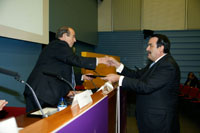
To the team led by José Luís Villanueva in a multi-center study carried out at five Madrid hospitals for their study: Ventilación mecánica, gastrostomía percutánea y toma de decisiones en pacientes con ELA: encuesta sobre la opinión de los pacientes, familiares y médicos (Mechanical ventilation, percutaneous gastrostomy and decision making in patients with ALS: an opinion survey among patients, their relatives and doctors).
The objective of this project is to evaluate the usefulness of planning treatment in advance when dealing with patients who have Amyotrophic Lateral Sclerosis. In particular, the aim is to evaluate the different perceptions held among the individuals involved in the healthcare process (doctors, main family caregivers and patients).
2009
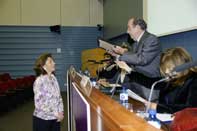
The aim of this study is to explore the positive and negative aspects of informing a hospitalized minor, and to explore the child's perception of this process. The aims of the project are:
- to identify the factors which facilitate or obstruct the process of informing the child and his or her family in a health setting
- to understand the child's perception of the information supplied, from the perspective of health ethics.
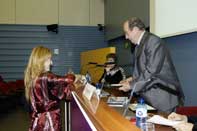
The purpose of this project is to create a global technological platform on advanced directives. The work will be developed using a web-based software application to incorporate contributions from a range of sources, and will use web 2.0 tools.

Medicine has developed techniques which make it possible to submit embryos to preventive genetic testing to avoid the risk of transmitting hereditary diseases. However, this corrective intervention could give way to perfective intervention to improve memory, musculature and height, or to genetically select for sex. This forces us to consider whether genetic modifications in sportspeople to improve their physical abilities can be justified.
2008
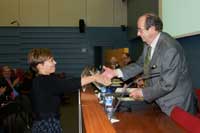
The team directed by Araceli Teixidó of the Hospital St. Jaume of Calella for the study: Anàlisi qualitativa del procés d'informació diagnòstica en pacients amb demència a la Corporació de Salut del Maresme i la Selva: s'ha d'incloure el malalt dement en el procés d'informació de la seva malaltia? (Dementia and the principle of autonomy. A qualitative analysis of the process of diagnostic information in patients with dementia with the Health Corporation of the Maresme and La Selva: Should patients with dementia be included in the information process regarding their illness?).
This study takes as its starting point the perception of medical staff regarding patients with dementia. After diagnosis, both the opinions held towards patients and the relationship with them usually changes. To identify whether this perception fits with the reality, the study seeks to identify whether or not doctors envisage a diagnostic information process with dementia patients, as is the case with other serious illnesses, or whether they exclusively address the patient's relatives. In addition, the research also considers the position of relatives and of some patients.
The final objective is to identify the level of autonomy granted to the patient during the process, and whether this is related to the patient's actual level of capacity or if this is assumed to be non-existent as a result of the diagnosis.
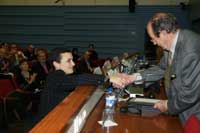
To the researchers María Luisa Martínez, Margarita García and Valentín Navarro of the Catalan Oncology Institute, Hospital Duran i Reynals in Barcelona for the study: Donació de mostres de teixit per investigació: percepcions i disponibilitat entre malalts oncològics (Donation of samples of tissue for research: perceptions and availability among oncology patients).
Knowledge of cancer is growing exponentially due to knowledge of the human genome and the advantages which technological progress offers to science. This scientific development depends on the availability of human tumour samples and other tissue samples. Obtaining these has become a priority.
The study aims to explore the perception and availability of cancer patients with regard to the donation of samples for research and storage. As secondary goals, it also seeks to identify the perceptions of cancer patients regarding research with human samples, to identify factors associated with availability for donation, and to draw up and validate the questionnaire for evaluation of the study variables.
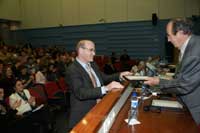
To Asaf Grauer Rodoy of the Department of Criminal Law at the Universidad de Valencia for the study Problemes jurídics dels biobancs (Legal problems of biobanks).
As a result of the recent introduction of Act 14/2007, the Spanish legal system has recognised the bio-bank phenomenon for the first time. However, the existing legislation is a long way from resolving all the doubts which have arisen in practice.
The project aims to conduct a thorough study which provides a satisfactory explanation of the legal reality and of the uses of bio-banks in modern society. To achieve this, it will analyse a range of issues which the legislation has avoided but which are essential for the legal regulation of biobanks.
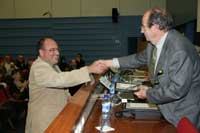
The team directed by Pablo Hernando of the Parc Taulí Health Corporation of Sabadell for the study Validación de la escala MacCAT-T: herramienta para evaluar la capacidad en la toma de decisiones sanitarias (Validation of the MacCAT-T scale: a tool for assessing competence to take health decisions).
The main objective of this project is to validate, adapt and translate the MacCAT-T into Spanish. The MacCAT-T is a tool which examines the ability of individuals to understand, reason, appreciate and express a choice in order to consent to medical treatment. In the United States, this tool is used as a reference in legal contexts, but in Spain we still lack capacity assessment protocols, of which a tool like the MacCAT is an essential part.
In addition to adapting the MacCAT-T, the study will observe its correlation with the CME (Cognitive Mini-Exam), analyse the results of the MacCAT in four patient groups, and assess how easy it is to use.
2007

To Ernest Güell Pérez and Antonio Pasqual López of the Research Institute of the Hospital de la Santa Creu i de Sant Pau of Barcelona for the work: Descripció de les característiques dels pacients ingressats a una unitat de cures pal·liatives que verbalitzen desitjos de mort o demanda d'eutanàsia (Description of the characteristics of patients admitted to the palliative care unit who express the desire to die or request euthanasia).
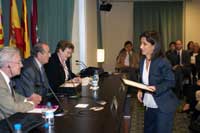
To Asunción Esteve of the Centre for Innovation Law & Policy at the University of Toronto for the study Patentes sobre los resultados de la investigación con células madre. (Patents based on the results of stem cell research).
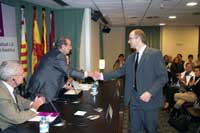
To the research team headed by Juan Carlos Siurana of the Department of Legal Philosophy at the University of Valencia for the project: Problemas éticos en la comunicación con los pacientes inmigrantes infecciosos de larga duración y con tratamientos paliativos en el Hospital Doctor Moliner de Portacoeli, Valencia (Ethical problems in communicating with immigrant patients with long-term infectious diseases and palliative care at the Doctor Moliner Hospital of Porta Coeli, Valencia).
2006
To Glòria Miró Andreu, of the Mataró Hospital of the Maresme Health Consortium for the study: Factores asociados al conocimiento y realización de documentos de voluntades anticipadas en enfermos con patología neurodegenerativa (Factors associated with awareness of and drawing up living will documents in patients with neurodegenerative pathology).
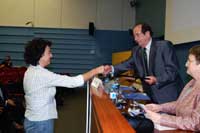
To the research team headed by Montse Esquerda i Aresté of the Universitat de Lleida for the project: Escala de competència del menor de Lleida (Lleida minor's competency scale).
To María Jesús Gómez Ramos and María del Carmen Sánchez Álvarez of the Hospital General Reina Sofía in Murcia for the study: Escala pronóstica de la negación del ingreso en UCI como forma de LET (EPNIL)(Prognostic scale for refusing admission to ICU as a form of LET (EPNIL)).
2005
To Antonio Casado da Rocha of the Department of the Philosophy of Values and Social Anthropology at the Universidad del País Vasco for the study Aproximación filosófica a la enfermedad de Huntington: diseño de un marco ético para investigaciones en genética molecular (A philosophical approach to Huntington's disease: designing an ethical framework for research in molecular genetics).
Jordi Vallverdú i Segura, Associate Professor at the Department of Philosophy of the Universitat Autònoma de Barcelona for his study: Las fronteras del lenguaje bioético: un nuevo pensar (The frontiers of bioethical language: a new way of thinking).
To the research team directed by Juan Antonio Barcia Albacar of the General University Hospital of Valencia for the study: Tratamiento integral del paciente con tumor cerebral. Comunicación y toma de decisiones como elementos clave en la promoción del bienestar (Integrated treatment of the patient with cerebral tuours. Communication and decision-taking as key elements in the promotion of well-being).
2004
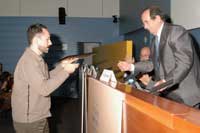
To Jordi Vallverdú, Professor of Philosophy at the Universitat Autònoma de Barcelona for his project: e-Biotecnología: simbiosis de valores. (e-Biotechnology: symbiosis of values).
Vallverdú, J. Bioética computacional: [e-biotecnología : simbiosis de valores]. Editorial: Fondo de Cultura Económica de España, S.L. 220 p. ISBN 9788437506234
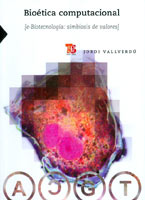
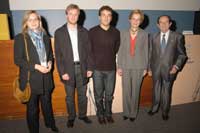
To the researchers Tomeu Adrover, José Luís Luján, Gemma Revuelta and David de Semir from the University Illes Balears and the Observatory of Scientific Communication for their project: Cèl·lules mare, la petjada mediàtica. La comunicació social i la generació de debat sobre les cèl·lules troncals a la premsa espanyola. (Stem cells, the footprint left in the media. Social communication and the debate generated by stem cells in the Spanish press).
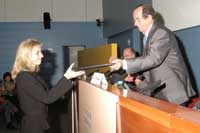
To the researchers Lidia Casanueva, Pedro Ruiz, Juan Ignacio Sánchez and José Carlos Mingote from the Intesive Care Unit at the Hospital 12 de Octubre in Madrid for their project: Impacto de un programa de mejora en la atención a los niños y sus familias en el proceso de morir en una Unidad de Cuidados Intensivos Pediátricos. (The impact of a project to improve care for children and their families up until the end of life in the Pediatric Intensive Care Unit).
2003
To the researchers Salvador Quintana, Roser Font, Imma Sandalinas and Margarida Mañas from the Ethics Assistance Committee, Hospital Mutua in Terrassa, for their project: Elaboració i instauració de la Guia per al correcte ús de les Ordres No Reanimació en un centre d'aguts i la seva posterior avaluació (Creation and introduction of a guide for the correct use of ‘Do Not Resuscitate Orders' in a critical care center and subsequent evaluation).
To the researchers María Pilar Loncán, Joan Carles Rovira and Olga Sabartés from the Foundation Residence Sta. Susanna, Caldes de Montbui, the Foundation Hospital Sant Jaume de Manlleu and the Social Health Foundation in Manresa, for their project: Promoció de la presa de decisions de la gent gran en relació a la seva salut (Promoting decision-making among the elderly regarding their health).
To María Angeles Rubio Gil of the Juridical and Social Sciences Department at the Universidad Rey Juan Carlos, Madrid, for her project: Responsabilidad ética en la información en materia contraceptiva en España: teoría y práctica social (Ethical responsibility in informing about contraceptive material in Spain: social theory and practice).
2002
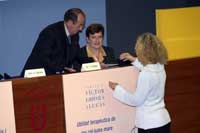
To Oriol Mir, Professor in the Department of Administrative and Procedural Law of the Universitat de Barcelona, for the project: Productes transgènics: riscos jurídicament controlats? (Genetically modified products: legally controlled risks?).
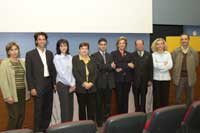
To the researchers María Julia Bertomeu, María Graciela de Ortúzar and Susana Sommer, of the Center for Philosophical Research at the Universidad Nacional de la Plata in Argentina, for the project: Justicia en salud: genética y derechos reproductivos (Justice in health: genetics and reproductive rights).
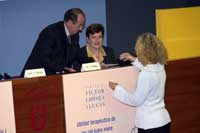
To Juan María Sánchez Segura, principal researcher of the welfare team of the Intensive Care Service of the Santa Creu i Sant Pau Hospital of Barcelona for the project: Coneixement de la llei de voluntats anticipades pels malalts i familiars atesos en un servei de medicina intensiva a l'any i mig de la seva publicació (Knowledge of the law of living wills among patients and relatives attended by the intensive care service one-and-a-half years after introduction of the law).
2001
To the researchers Ana Sánchez Urrutia, Mónica Navarro, Andrés Navarro and Ana Sanz of the Bioethics and Law Observatory of the Parc Científic at the University of Barcelona for the project: Estudio de la tarjeta sanitaria. Incidencia sobre el derecho a la intimidad de las personas y la protección de los datos personales (Study of the Spanish health card. Its effect on the individual's right to privacy and the protection of personal information).
To José Javier Barbero, Psychologist with the Area 7 Home Care Support Team of the Spanish health service in Madrid for his project: Influencia de un Curso de Formación en Bioética en la detección y categorización de problemas éticos en un Equipo de Soporte de Antención Domiciliaria que atiende a enfermos terminales y a sus familias con una filosofía y una metodología de Cuidados Paliativos (The effect of a bioethics training course on the detection and classification of ethical problems in a support team providing home care for terminal patients and their families, using a philosophy and methodology of palliative care).
2000
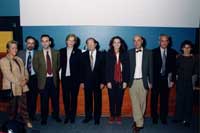
To Lluís Cabré, as the lead researcher from his multi-center team on the project: Estudio de la evolución, pronóstico y resultado de los pacientes afectos de fracaso multiorgánico ingresados en los servicios de medicina intensiva (Study of the evolution, prognosis and outcome of patients suffering from multi-organ failure admitted to intensive care).

To the researchers Salvador Quintana and Roser Font of the Clinical Ethics Committee at the Hospital Mútua in Terrassa, Barcelona for their project Mesures de restricció física: estudi de prevalença i anàlisi d'aspectes ètics relacionats amb la seva indicació (Physical restraint measures: a study of its prevalence and an analysis of ethical aspects of its use).
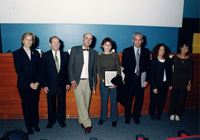
To the researchers Anna Falcó, Joaquín Tomás, Ferran Rega and Isabel Pera, from the Escola d'Infermeria Gimbernat of Sant Cugat del Vallès, Barcelona for their work: Estudi sobre la influència de la metodologia docent de les assignatures d'Ètica i Legislació en Infermeria i de Bioètica, en els estudiants de la Diplomatura Universitària en Infermeria, en relació a la integració dels valors propis de la professió infermera (Study into the influence of teaching methodology of Nursing Ethics and Legislation and of Bioethics on the students of the University Nursing Diploma, with regard to the acquisition of the personal values of the nursing profession).
